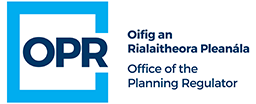Variations in pre-planning application consultation services(1) offered by local authorities have been identified in a new Case Study Paper published by the Office of the Planning Regulator (OPR).
In its Case Study Paper (CSP), “Pre-Application (S247) Consultation Services, an Analysis of Practice across the Local Government Sector,” the OPR consulted with each local authority in relation to how their pre-application consultation process operates.
The paper provides a snapshot of pre-application consultation services and aims for a greater exchange of expertise and learning in relation to such services across the local authority sector.
Among the report’s findings are:
- 74% of local authorities have an online pre-application form for the public to request a consultation, with three local authorities (10%) offering a GIS/self-service interface system;
- 90% of local authorities offer bespoke advice unique to the site and proposal;
- 90% regularly include officials from other sections of the local authority whereas the involvement of external agencies is less frequent;
- The format of pre-application consultation is typically in the form of individually scheduled meetings and most local authorities (21 out of 31) provide a template for pre-application consultations;
- 88% of local authorities are proposing changes to their pre-application system in response to their experience in the pandemic;
- There are varying degrees and levels of recording the outcome of pre-application consultation, with two thirds of local authorities indicating that records are made available on receipt of a planning application;
- ICT systems are not standardised across the 31 local authorities such that the tracking and recording of the pre-application consultation services provided is uneven and overall quite weak;
- Overall 58% of local authorities consider that fees should be introduced given the resource requirements of providing this service; whereas 26% do not consider fees are appropriate; and
- Pressure on resources both in terms of staff and time has been highlighted by a significant number of local authorities as a result of an increase in pre-application consultation requests. Some local authorities identified an uplift in requests of the order of 35-42% from the same period last year;
As part of the paper, the OPR has proposed “Seven Guiding Principles” that can serve as a checklist for self-evaluation of the pre-application consultation service offered by local authorities.
The OPR will work with the local government sector, through our statutory reviews function, to encourage more harmonisation towards a high level of service. The Office will also engage with other stakeholders in the planning system to encourage the development of data-based self-service solutions, consistency, transparency and effective monitoring of this key service.
The Planning Regulator, Niall Cussen said;
“Making an application for planning permission can be a complex and demanding process that involves time, preparation and costs. Pre-application consultation processes improve consistency, certainty and speed for users of the planning system.
Our research shows that several local authorities are innovating with new on-line and self-service tools that citizens can use to simply and clearly understand how the planning application process works.
However, as with our previous research which examined the availability of on-line planning services, we have found that there is a wide variance between local authorities in the form and type of pre-application consultation services they offer.
The research we have undertaken will enable local authorities to achieve greater consistency in the services they offer. Greater harmonisation will ensure that citizens have good opportunities to understand how the process works which in turn will enhance the planning system and hopefully reduce pressures at the subsequent application stage.
We have also identified “Seven Guiding Principles” which can be used as a checklist for self-evaluation of pre-application consultation, highlighted examples of existing good practice and included sample templates for reference.
The OPR will work with the local government sector through our statutory reviews function to encourage more harmonisation towards implementing a best practice approach.”
The project method for this CSP comprised three phases, desktop review, engagement and conclusions.
This is the fourth in a series of OPR Case Study Papers. They are issued to promote shared learning and highlight best practice in accordance with the OPR’s statutory remit to engage in education, training and research activities.
- Pre-Application Consultation Services: Consultations in relation to proposed development between a prospective applicant, who has an interest in land, and the planning authority are provided for under Section 247 of the 2000 Act.
These consultations are formally referred to as ‘pre-application consultations’ and more commonly as ‘pre-planning’.
Local authorities have certain discretion as to whether to enter into these consultations. However, provisions made under the Planning and Development (Housing) and Residential Tenancies Act 2016 and the Planning and Development (Amendment) Act 2018 require consultations to be held within four weeks of requests in respect of residential development of more than 10 housing units or non-residential development of more than 1000 square metres gross floor space and Strategic Housing Developments (SHDs).
Additional points to clarify:
- For clarity this study did not examine the timelines associated with the delivery of the pre-application consultation service given the context of the COVID-19 pandemic.
- Further amendments to the pre-application consultation regime will result from forthcoming legislative changes relating to Large Residential Developments (LRDs) that Government intends will supersede the current Strategic Housing Development (SHD) process.
